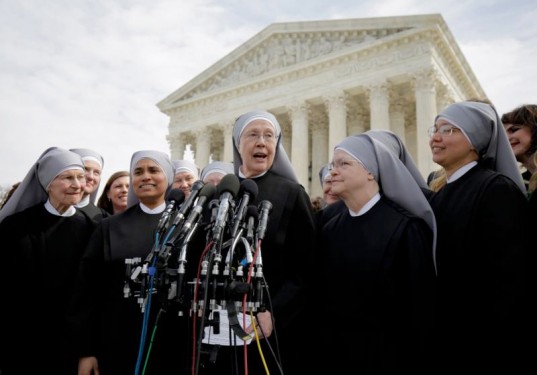
WASHINGTON (CNS) – The U.S. Supreme Court has sent the Zubik v. Burwell case, which challenges the Affordable Care Act’s contraceptive requirement for employers, back to the lower courts.
The justices’ unanimous decision, explained in a nine-page unsigned opinion, was based on the information that both sides submitted a week after oral arguments were heard in the case about how and if contraceptive insurance coverage could be obtained by employees through their insurance companies without directly involving religious employers who object to this coverage.
The court made clear that it is not expressing an opinion on the merits of the cases that are challenging aspects of the federal government’s health legislation and it also was not ruling on the issue of a potential violation of religious freedom.
Because of the “gravity of the dispute and the substantial clarification and refinement in the positions of the parties,” the court stated that religious employers and the government should be “afforded an opportunity to arrive at an approach going forward that accommodates petitioners’ religious exercise while at the same time ensuring that women covered by petitioners’ health plans receive full and equal health coverage, including contraceptive coverage.”
The court stressed that this approach is “more suitable” than addressing the refined positions submitted by both sides and added that “although there may still be areas of disagreement between the parties on issues of implementation, the importance of those areas of potential concern is uncertain, as is the necessity of this court’s involvement at this point to resolve them.”
Five appeals courts had ruled in favor of the contraceptive mandate and one had ruled against it. Now, equipped with the new information both sides submitted to the Supreme Court, the lower courts have been ordered to review these cases once more.
Justice Sonia Sotomayor and Justice Ruth Bader Ginsburg wrote separately to stress that the court had not decided any of the legal questions in the cases and cautioned the lower courts not to read anything into the new opinion.
“This is a game-changer,” said Mark Rienzi, lead attorney for the Becket Fund for Religious Liberty, which represents the Little Sisters of the Poor, one of the group’s challenging the federal contraceptive mandate.
He said the opinion reflects that the court has “accepted the government’s concession” that it can provide contraceptives to women “without using the Little Sisters.”
He also was pleased the court was forbidding the government “from fining the Little Sisters even though they are refusing to bow to the government’s will. It is only a matter of time before the lower courts make this victory permanent,” he said in a May 16 statement.
‘Struggle Will Continue’
Washington Cardinal Donald W. Wuerl had a more nuanced look at the court’s opinion, saying he was pleased that it offered a path forward, but he also acknowledged that “this struggle will continue.”
The Washington Archdiocese is one of several plaintiffs in this case.
The cardinal said the archdiocese will continue its work to “serve others in education, health care, social services, and outreach to the poor and those most in need. We will continue to do that because we are resolute that it is precisely by being true to our Catholic identity in what we proclaim and in what we do that we can continue to help realize a truly good and just society.”
Bishop David A. Zubik of Pittsburgh, for whom the consolidated group of cases is named, said in a statement that the Pittsburgh Diocese was grateful the justices “recognize our willingness to reach a resolution that allows us to abide by our faith and the government to achieve its goals.”
“We have already stated our willingness to come to such an agreement and we hope that the government shares that willingness,” he added.
“Burwell” in the case name is for Sylvia Mathews Burwell, who is secretary of the Department of Health and Human Services.
Father Frank Pavone, national director of Priests for Life, another of the plaintiffs, said he and other in his organization are “studying the implications of this development and are encouraged by it.”
He said the group, in response to the court’s request for more information, showed that there is “a way for the government to pursue its objectives without burdening our freedom of religion. We are ready to present these new arguments in the court of appeals.”
